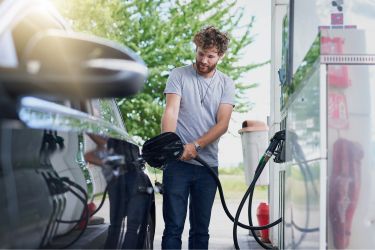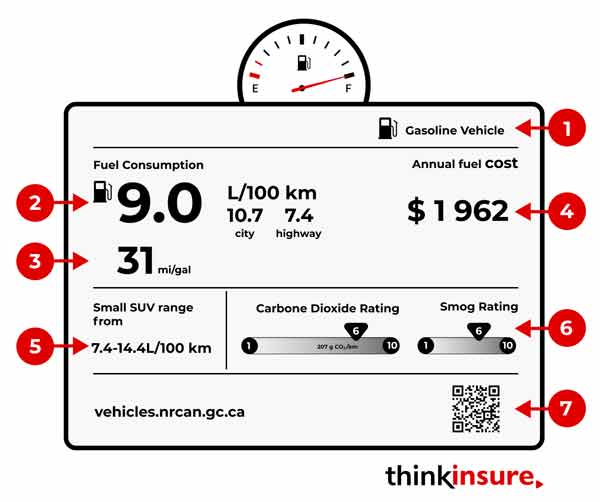
Written by Kayla Jane Barrie Updated on Nov 24, 2025 6 mins read

Fuel efficiency is a term used to describe how effectively a vehicle uses fuel to power the engine and generate motion.
It is typically measured in miles per gallon (MPG) or litres per 100 kilometres (L/100km), indicating the distance a vehicle can travel on a specific amount of fuel. The higher the MPG or the lower the L/100km, the more efficient the vehicle is in terms of fuel consumption.
Maximizing fuel efficiency is crucial for reducing our carbon footprint and promoting sustainability. To make informed decisions about our vehicles, we must understand fuel efficiency, how to improve it, why cars lose efficiency over time, and whether hybrid cars genuinely live up to their reputation.
Fuel efficiency, or fuel economy, refers to the distance a vehicle can travel on an amount of fuel. Vehicles listed as having a fuel efficiency of less than 6L/100 km are considered fuel-efficient.
The 100 km is how many litres of fuel the car needs to travel 100 km. The lower the number of litres stated, the better the vehicle’s fuel economy is. Depending on how many kilometres you drive per year, purchasing a car with low fuel economy can be top of mind.
There are many options for the best fuel-efficient vehicles in Canada; from cars, trucks, and SUVs, you can lower your monthly gas costs and meet your driving needs and dreams.
The best way to determine if your vehicle is fuel-efficient is to compare the fuel economy number versus the cost of gas and the car. Calculating fuel costs for cars of different engine sizes can be determined by calculating their average fuel efficiency in kilometres per litre (km/L). With an assumed yearly mileage of 15,000 km, we can use average fuel efficiency to make informed decisions about fuel expenses.
Here is an example:
Assuming a fuel price of $1.45/L and given fuel efficiencies and mileage, the annual fuel costs for cars with engine capacities 4L, 5L, and 6L would be $2175, $2718.75, and $3625, respectively.
You may have a vehicle with low usage per kilometre, but you should drive in fuel-efficient ways and maintain your vehicle to achieve the best efficiency.
With the vehicle you have now, you can drive more fuel-efficiently with these techniques:
When you are not driving, there are tips you can follow to improve the fuel economy, such as:
Shopping smart can help you save money on fuel. If you’re ready to buy the best fuel-efficient vehicle or looking for a hybrid car. Here are five tips for buying a fuel-efficient vehicle.

You can locate a car's fuel economy on the EnerGuide label. If you're not familiar with the EnerGuide label, it's typically affixed to the vehicle and displays fuel consumption ratings for both city and highway driving. Additionally, it offers an estimate of the vehicle's yearly fuel cost. Here's an example:
Hybrid cars have become popular because they improve fuel efficiency and reduce emissions. These vehicles use a combination of an internal combustion engine, an electric motor, and a battery pack to optimize power delivery and minimize fuel consumption, especially during stop-and-go driving conditions.
Although hybrid cars usually provide better fuel efficiency when compared to traditional gasoline-powered vehicles, the actual performance of a hybrid car can be influenced by several factors, including driving habits, vehicle size, and the level of technological advancement.
Variables such as driving style, terrain, and weather conditions all play a significant role in determining the effectiveness of hybrid systems in conserving fuel.
If you’re ready to ditch fuel entirely, take a look at the best electric vehicles or electric trucks in Canada.
If you notice your car is losing fuel efficiency, there are a few reasons why it may be happening. It may be due to poor driving habits (heavy braking and accelerating) or mechanical issues. Here is a list of potential problems and solutions to improve fuel usage.
Although you can save money on your fuel expenses, purchasing a fuel-efficient car will not impact your car insurance quotes. Insurance costs are reflected in various aspects, including your driving habits and vehicle safety features.
Motorcycles can be more fuel-efficient compared to vehicles. An experiment by MythBusters found that models made in the 2000s used 28% less fuel than cars. If you’re making the switch over to two wheels, don’t forget to update your motorcycle insurance
Maximizing fuel efficiency is a wise financial decision and an important step towards reducing our environmental impact and promoting sustainability.
We can achieve this by implementing proactive maintenance practices, developing safe driving habits, and exploring alternative fuel technologies. By doing so, we can all play a part in creating a greener and more sustainable future on the road.
| Categories | Auto |
|---|---|
| Tags | Repairs and MaintenanceDriving Tips |
Read our insurance blog to get helpful tips, information and news.
Learn about Canada's new Electric Vehicle Affordability Program (EVAP). Discover how the $50,000 transaction rule works, which cars qualify, and how to claim your rebate.
Fatal collisions in Canada rose 9.14% from 2019 to 2023. Discover the latest road safety statistics, provincial rankings, and how these trends affect your auto insurance rates.
Find out if a seatbelt ticket will raise your car insurance rates and how insurers view seatbelt violations.
Ontario’s Project CHICKADEE dismantled a $25 million auto theft ring. Discover how this massive bust targets export enablers and what it means for rising Canadian insurance premiums.